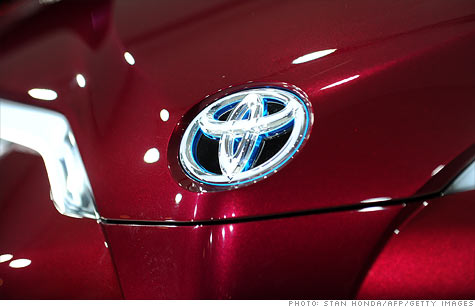
Critics have pointed to electronics as a possible cause of unintended acceleration in Toyota cars, but a report last year by NHTSA and NASA pointed to other problems, instead.
NEW YORK (CNNMoney) -- Government safety regulators and NASA researchers were right to dismiss electronics problems as a likely cause for unintended acceleration in Toyota vehicles, according to a new report from the National Academy of Sciences.
But the National Highway Traffic Safety Administration should have had the expertise to reach that conclusion without needing outside help. The fact that NHTSA didn't feel competent to investigate Toyota (TM) electronics on its own points to a troubling weakness at the agency, the NAS report says.
The panel of technical experts that authored the new report was convened by the NAS, at the request of National Highway Traffic Safety Administration, to look into ways to investigate future unintended acceleration problems in modern cars with computerized control systems.
A report issued by NHTSA last year, after the NAS committee had been formed, found no reason to think that failures in software or electronics systems had anything to do with a rash of reports that Toyota vehicles were speeding up out of control.
NHTSA had enlisted scientists from the space agency NASA to investigate the possibility that electronics were at fault, as some consumer advocates and personal injury attorneys had claimed. Instead, the report found three likely causes: Floor-mats trapping accelerator pedals. A gas pedal defect that caused some accelerators to get stuck. And, in many cases, drivers mistakenly pressing down the gas pedal instead of the brake pedal.
Toyota recalled millions of vehicles in 2008 and 2009 for defects related to pedals and floor mat obstruction.
While the new NAS report supports NASA's conclusion and calls NHTSA's decision to close the investigation "justified," it did raise a red flag.
"It is troubling that the concerns associated with unintended acceleration evolved into questions about electronics safety that NHTSA could not answer convincingly, necessitating a request for extensive technical assistance from NASA," the report said.
Compared to more complex and sophisticated electronics systems that automakers are now working on or that are even available to the public already -- including technology that can virtually drive a car itself -- electronic throttle control is relatively simple and straightforward. Considering that the technology is virtually ubiquitous on modern automobiles, NHTSA should have had the technical expertise to handle the investigation itself, the NAS report said.
"NHTSA has already taken steps to strengthen its expertise in electronic control systems while expanding research in this area -- and the agency has considerable experience dealing with vehicle electronics issues in its research, rulemaking, and enforcement programs," the safety agency said in a statement responding to the NAS report.
Increasingly complex electronics systems will only increase the potential for safety questions, the NAS report said. For that reason, the report urges NHTSA to undertake a strategic review aimed at improving the safety agency's technical expertise in automotive computer systems.
Like the Federal Aviation Administration, which oversees aircraft safety, NHTSA should become involved more deeply -- and much earlier -- with automakers in looking at ways to ensure safety.
Among other specific recommendations, the report said that NHTSA should convene a "standing technical advisory panel" to deal with electronics issues.
The report also strongly backs NHTSA's request that "event data recorders" be improved so they can track a broader range of data. Today's devices, which are installed in most new cars, continuously record data -- including speed, gas and brake pedal use and steering wheel angle -- then store several seconds worth of that data in the event of a crash.
Improved data recorders could look for brief electronics malfunctions as well as for driver errors, making it easier to diagnose system defects, the report said. ![]()